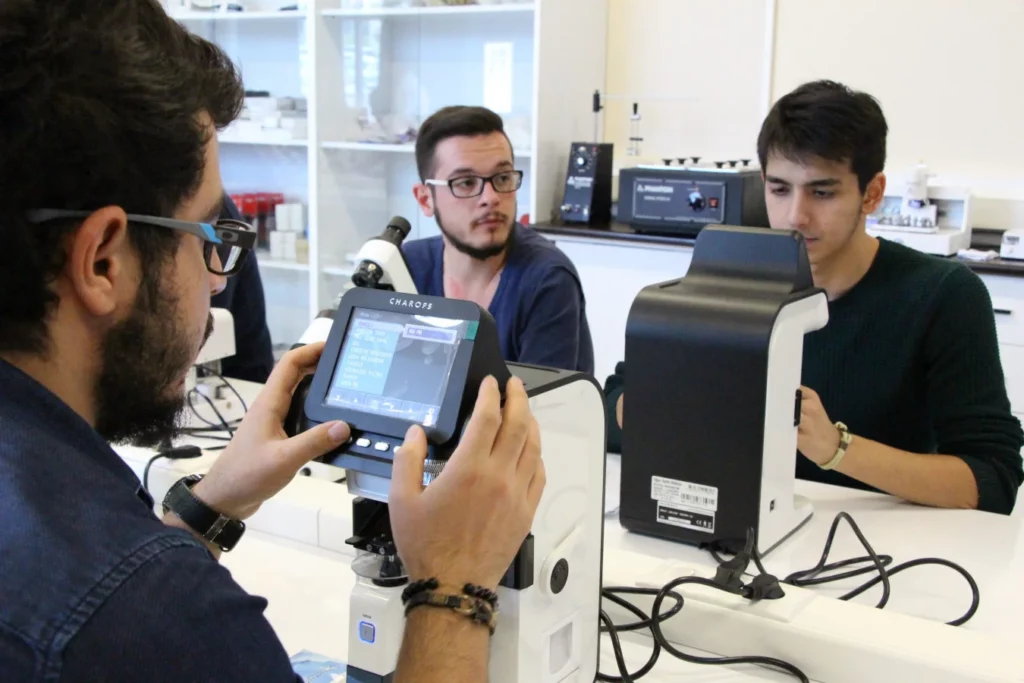Engineering is considered one of the most profitable career paths in Turkey, and as it is a prestigious career, studying engineering in Turkey is preferred by international students as well. Students graduating from engineering departments have numerous career opportunities in government institutions and private organizations. Additionally, engineering is one of the most advantageous professions for those who aspire to pursue their careers abroad.
Turkish and international students can study engineering in both associate and bachelor’s degree programs. Associate degree programs, which last for two years, provide students with a basic foundation and also allow them to continue their studies and enrol in four-year bachelor programs. Bachelor programs can be extended to a master’s degree qualification, and this gives students deeper expertise in their field.
Popular Engineering Disciplines
Potential engineering students have a large selection of engineering specialities for them to pick and study, such as:
- Mechanical Engineering,
- Electrical Engineering,
- Civil Engineering,
- Computer Engineering,
- Chemical Engineering,
- Environmental Engineering,
- Industrial Engineering,
- Aerospace Engineering,
- Petroleum Engineering,
- Metallurgical Engineering,
- Food Engineering,
- Textile Engineering.
Graduates have great job opportunities globally and many continue their studies abroad. The faculty prepares students with technical skills and adaptability. Programs cover basic sciences, engineering, and humanities and the faculty has four departments with advanced labs.

Leading Private Universities for Engineering in Turkey
Bilkent University
Bilkent University’s Faculty of Engineering has been educating leaders and innovators since 1986. Every year, it accepts around 600 students who rank in the top 2-3% in Turkey’s national university entrance exam, and about 100 international students from various countries.
Koç University
Koç University’s Faculty of Engineering is a productive environment for students, with 60 faculty members, 3113 alumni, 1084 graduate students, 110 awards, over 2800 publications, 56 laboratories, 300 projects, 100 patents, 5 spin-offs, and a research budget of 211 million TL.
Modern equipment is available in the university’s laboratories, and the majority of the faculty members are young and actively involved in research. The goal of the Engineering Faculty is to produce the best graduates in Turkey, qualified for international competition, independent, objective and creative thinkers, and capable leaders in their field.
Sabancı University
Sabancı University is the first university to offer the freedom to choose programs in Turkey. This system allows students to gain knowledge of disciplines other than their chosen fields. In the first application process to Sabancı University, students determine their preferences based on ‘program groups’ within the faculties, not specific ‘departments.’ Sabancı University embraces an interdisciplinary approach and gives a high-quality education to its students.
Bilgi University
Bilgi Faculty of Engineering and Natural Sciences was founded in 2009. This faculty is interdisciplinary and it provides undergraduate education to students. Bilgi University encourages its students to have fresh perspectives with innovation within its departments. These departments include Computer Engineering, Bioengineering, Electrical and Electronics Engineering, Industrial Engineering, Energy Systems Engineering, and Mathematics.

Tuition Fees of Private Universities
The tuition fees of private universities are acceptable, they range from $3,500 to $12,000 per year. The language of instruction, university and the chosen program all affect the cost.
General Admission Requirements
Engineering programs need certain requirements to be admitted by international students, such as notarizing key certificates and demonstrating language proficiency. International students must have a high school grade alongside their exam scores.
The first thing to decide is whether to study in English or Turkish. Most universities offer programs in both English and Turkish, so students can choose based on their language skills and career goals.
Requirements for Private Universities
For private universities, the admission requirements typically include a high school diploma with a minimum score of 60%. For programs in the English language, students usually require a TOEFL score of a minimum of 67-78. Although it is not a must, a certificate acquired by taking the test SAT can prove to be advantageous for the candidate.
Advantages of Studying Engineering in Turkey
Studying engineering in Turkey offers students a lot of benefits. First of all, the universities are globally recognised and the tuition fees are more affordable when compared to other countries. Also, there are many disciplines available for students in engineering programs.
Engineering Education in Private Universities
Private universities in Turkey are gaining popularity among international students. They have developed effective marketing strategies to attract more students, leading to a notable rise in international enrollments. Studying engineering at private universities offers several advantages:
- Competitive tuition fees.
- Distinguished rankings and international accreditations.
- Opportunities to participate in the Erasmus program, allowing study in Europe.
- Access to modern laboratories and facilities.
- Training programs aligned with labour market demands.
- Availability of English-taught programs.
- Diverse and vibrant international student communities.
Curriculum and Specializations
Engineering programs in Turkey usually take four years. Both the Faculty of Engineering and the Faculty of Technology offer a Bachelor of Engineering degree, but they focus on different things. The Faculty of Engineering focuses on theory and project development, while the Faculty of Technology focuses on practical applications.
Mechanical Engineering
Mechanical Engineering is one of the oldest and most fundamental engineering disciplines. The curriculum covers thermodynamics, industrial design, heat and energy transfer, and cooling systems.
Electrical and Electronic Engineering
Electrical and Electronic Engineering studies electrical circuits, energy systems, basic electrical machines, communication systems, and computer engineering.






